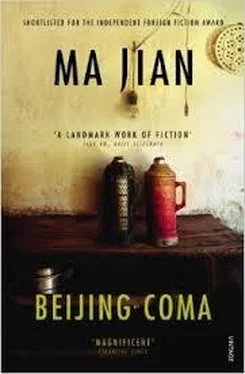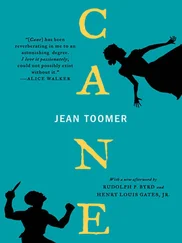‘Shut up! You never read books, but as soon as you hear the words “sexual climax” you suddenly become interested.’ I looked at the haircut I’d just given him. After years of cutting my brother’s hair, I’d become quite proficient at it.
‘Why don’t you just stick to The Book of Mountains and Seas and plan your expedition!’ Tang Guoxian said, then roared with laughter. He was a champion marathon runner. Although I was as tall as him, I was much less strong. He was always pouring ridicule on my ambition to be an explorer.
In the end, Wang Fei and Sun Chunlin lost interest, so I read the book with Mou Sen. He’d planned to go to a private screening of Casablanca at the Guangzhou University campus, but soon changed his mind when he saw the book. He insisted that we read it on my bunk. He said that he found my pillow more comfortable than his, and was able to think more clearly when he rested his head on it, so I had no choice but to let him squeeze up next to me. We turned to the first chapter. Whenever he stopped to take notes, I’d read on to the end of the page, then close my eyes and wait for him to catch up.
Since the police had forced me to write the self-confession, I’d developed an aversion to writing. I rarely kept a journal. The only time I wrote anything now was when I copied Mou Sen’s lecture notes.
It was getting dark outside. After an hour of having our heads pressed together, our ears were beginning to hurt. We decided to take turns reading the book aloud to each other. To save time, we lit just one cigarette and passed it between us. We kept going until five in the morning. Everyone else in the dorm was fast asleep behind their mosquito nets. When we could stay awake no longer, we nodded off, our heads resting on The Interpretation of Dreams.
I dreamed that, just as I was about to drown in a river, I discovered I could fly. I flapped my arms and soared into the sky, yelling at the top of my voice.
‘Shut up!’ Mou Sen hissed. ‘I was in the middle of a good dream.’
‘Stop kidding yourself — you’ll never write a novel,’ I mumbled. He was always talking about his dreams, and would jot them down as soon as he woke up. He said that dreams were where writers got all their inspiration from.
I liked Freud’s ideas, especially his theories about the repression of memories from the conscious mind.
Your body continues to function, driven by instincts of its own. It doesn’t need your assistance. As Freud said, ‘The goal of all life is death.’
After reading Freud, I understood why I’d hated my father so much. Unconsciously, I’d viewed him as my enemy and oppressor. As long as he was around, I’d felt unable to hold my head up high.
I also understood why my mother remained married to my father, despite all the misery he caused her. As a young woman, she’d cut herself off from her ‘bourgeois’ family. When her father jumped off the roof of a tall building after the Communists appropriated his factory, she didn’t even go to identify the corpse. To prove her loyalty to the Party, she abandoned her mother and siblings. But when my father got into trouble, she couldn’t let go of him. She knew that if she lost him, she would have nothing left.
Around the time I met A-Mei, I picked up a literary journal in the library and read a translation of excerpts from Kafka’s novel, The Castle . Mou Sen had told me that if you didn’t read Kafka, you’d never grasp the underlying principles of biology.
When I finished reading the excerpts, I was reminded again of my father. The protagonist is a surveyor who is summoned to a castle to conduct a land survey. But when he arrives in the village governed by the castle, he finds that he’s neither needed nor understood. Some of the villagers even suspect him of being an impostor. The surveyor strives to gain recognition of his status, but is thwarted again and again by illogical bureaucracy. He moves in with a barmaid he dislikes, hoping that her relationship with an important official will help him gain access to the castle. In his struggle to resist his fate he is forced to become cunning and base, but inside, his frustrated spirit is writhing.
My father was condemned as a rightist. Like Kafka’s protagonist, he had no control over his fate or his status. My mother was his legal wife. The family she gave him enabled him at least to sense that he existed in society. But there was no love between them. Six years after my father returned from America to Communist China, he was no longer a professional violinist. He lost his identity. He knew that at any moment he could be executed for saying something the Party didn’t like, or for carrying in his pocket an object they didn’t approve of. He was as vulnerable as a rabbit in a laboratory. Cowardice and stuttering became his only skills in life. Even though my mother and I pitied him, we regarded him as an outsider. We never really knew what was going on in his mind. But I will never forget the look of terror that haunted his face so often.
I suddenly wanted to find out everything I could about my father.
I pulled out his journal from a pouch in my suitcase. It was an ordinary-looking notebook. When I’d skimmed through it the day my mother gave it to me, I’d wanted to fling it in the bin. I hated how he laced his notes on life in the camp with ingratiating remarks about the Party. While writing his thoughts down, he’d been constantly terrified by what might happen if they were discovered. It had struck me as a very clumsy way to live one’s life.
But now I began to read the journal more closely. In the last third of it, which was written in hospital, I discovered, to my surprise, that he’d secretly found faith in God. I understood now why he’d said how much he regretted not visiting a church or reading the Bible while he was in America, and why he’d asked me to bury his ashes in the graveyard of an American church after he died, pressing the address into my hand.
He wrote that he felt the spirit of God looking down on him. He believed that the suffering he’d endured in the camps had been a test of faith. On the last page of the journal, he wrote: ‘Almighty Father, I’ve spent long enough in Hell. Rescue me now and lead me into Heaven.’
My father was treated like an animal in the camps. The only time he got to eat meat was the day Nixon arrived in China in 1972. Not wanting to be accused of mistreating political prisoners, the government ordered every labour camp to give its inmates pork dumplings for lunch. A few years later, conditions improved a little. The prisoners were issued with sheets of newspaper to wipe their bottoms with and so were able at last to read snippets of news from the outside world.
My father had returned to the motherland after Liberation out of patriotism. He’d wanted to help build a new China, and had no idea that, within a few years, he’d be reduced to total subservience. When he was finally released from the reform-through-labour system, he tried to find a place for himself in society, but discovered that he was an outcast, with no work unit or marketable talent. He spent all his remaining energy struggling to regain his urban residence permit. All he wanted was to be an ordinary citizen like any other.
I wondered where his God had been when he’d needed Him, and what right He had to test my father’s faith in that way.
While I read the journal, I saw parallels with the passages from The Castle . In both texts, the spirits of people excluded and oppressed by a mad and irrational system become twisted and warped. Although I didn’t say a word to anyone, something inside me had changed. I was determined that I would, at the very least, avoid my father’s fate.
Читать дальше












